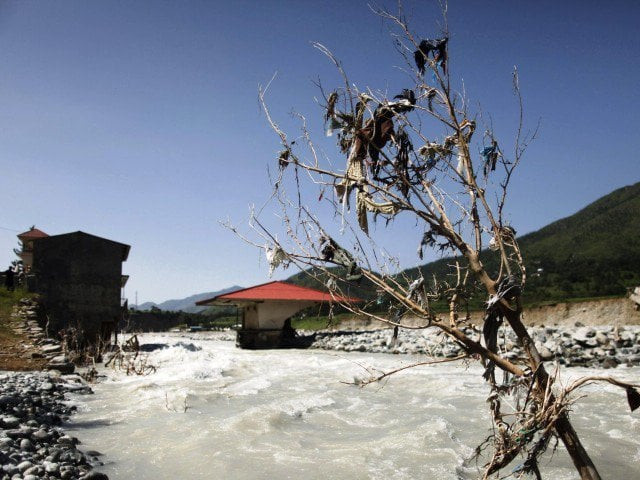Climate change to disrupt poor agricultural communities, say experts
According to the study, there is need to promote climate change adaptation strategies

Climate change PHOTO: REUTERS
These assessments were revealed in a research conducted to assess farmers’ use of climate change adaptation practices and impacts of food security and poverty in Pakistan. An over whelming majority ie around 87% of the farmers report observing changes in climatic conditions such as change in rainfall, monsoon onset and temperature, which suggests rural areas in Pakistan have been particularly hard hit by the climate change.
Moreover, 25% of the farmers had to shift to new crops due to changing weather conditions. While two-thirds of the farmers recycle their seed, and the rest use the seed from other sources, mostly from fellow farmers and dealers. Published in journal of Climate Risk Management earlier this year, the research was conducted by Akhtar Ali and Olaf Erenstien, in association with International Maize and Wheat Improvement Centre.
Pakistan hopes for UNDP aid in setting up institutions under Climate Change Act
The research draws its findings from dataset collected from 950 farmers in all four provinces of Pakistan which constituted of 275 villages, 350 farmers from the Punjab, 250 each from the Khyber-Pakhtunkhwa (KPK) and Sindh and 100 farmers from Balochistan.
Aimed at examining the factors influencing the choice of climate change adaptation practices and associated impacts on household food security and poverty, the study further reveals that 22% of the farmers typically adjusted the sowing time of their crops to the changing conditions, while 15% of the farmers adopted heat and drought tolerant varieties.
According the research, climate change is set to be particularly disruptive in poor agricultural communities since results show that younger farmers and farmers with higher levels of education are more likely to use these adaptation practices, as do farmers that are wealthier, farm more land and have joint families.
According to the findings, the number of adaptation practices used was found to be positively associated with education, male household heads, land size, household size, extension services, access to credit and wealth.
Moreover, farmers adopting more adaptation practices had higher food security levels, around 8%–13%, than those who did not and also experienced 6% lower levels of poverty. The research concluded that climate change adaptation practices at farm level can thereby have significant development outcomes in addition to reducing exposure to weather risks.
According to Akhtar and Olaf, there is scope for policy to further promote the adoption of climate-change adaptation strategies since the results highlight the importance of awareness and knowledge about the local context, climate change, adaptation strategies and its benefits, while also pointing out to the importance of wealth on the ability of the farm households to invest in climate risk coping strategies.
Govt sets out to fix environment
In this context, even though the recently announced budget for agriculture by the Punjab government does recognises the need for promoting integrated and sustainable use of natural resources along with creating food security but out of 25 new schemes only one scheme is dedicated towards addressing climate change related issues.
According to the details, in budget of Rs2.94 billion allocated for new schemes, Rs50 million has been allocated for promotion of gram cultivation through life saving irrigation and sprinkler system under climate change.
While in a budget of around Rs7.9 billion allocated for on-going schemes, just four out of 35 schemes address climate change related issues.
These schemes include introduction and adaptation of high value crops and fruits in climatic conditions of Punjab with a budget of Rs4 million, provision of additional research facilities for development of heat resilient maize hybrids in Faisalabad with Rs8 million, promotion of high value agriculture through provision of climate smart technology package with a budget of Rs500 million and rainwater management in cotton fields to minimise impacts of climate change with a budget of around Rs12 million.
Published in The Express Tribune, July 1st, 2017.



















COMMENTS
Comments are moderated and generally will be posted if they are on-topic and not abusive.
For more information, please see our Comments FAQ